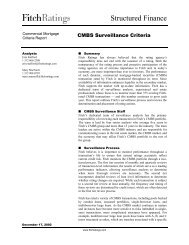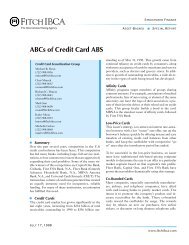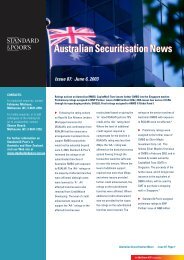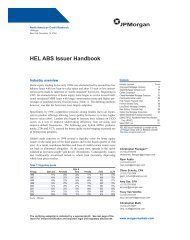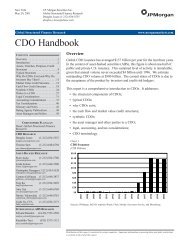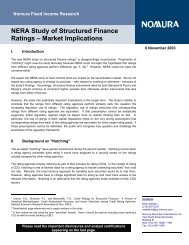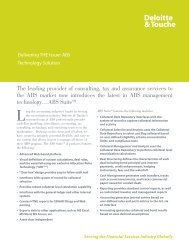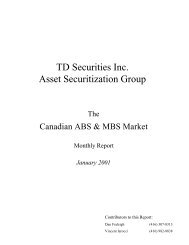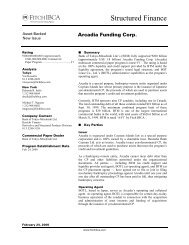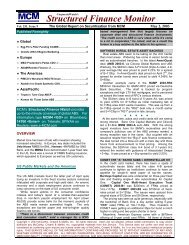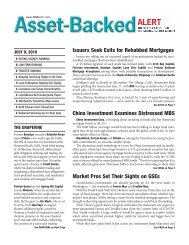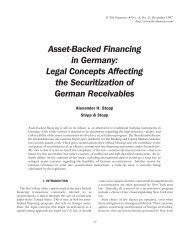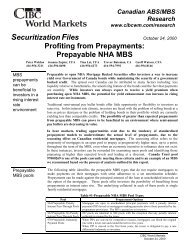Securitization Glossary - Securitization.Net
Securitization Glossary - Securitization.Net
Securitization Glossary - Securitization.Net
Create successful ePaper yourself
Turn your PDF publications into a flip-book with our unique Google optimized e-Paper software.
Nomura Fixed Income Research<br />
receivables – money owed to repay a loan or as payment for<br />
merchandise or services. In its broadest sense, the term<br />
receivables can include virtually all payment obligations. More<br />
narrowly, the term "trade receivables" refers to payments<br />
expected to be received in the near future (generally within 90<br />
days) relating to merchandise sold or services rendered.<br />
refinancing – substituting a loan with more-favorable terms for<br />
one with less-favorable terms. A borrower may refinance his<br />
loan when interest rates fall and he can obtain a new loan at a<br />
lower interest rate. In a typical refinancing, the proceeds of the<br />
new loan are applied to repay the older loan.<br />
REMIC – See "collateralized mortgage obligation." REMIC - 「CMO」の 欄 を 参 照 。<br />
reperforming mortgage loan - a residential mortgage loan that<br />
is contractually delinquent but on which the borrower<br />
consistently makes monthly payments. The loan may be<br />
characterized by "rolling delinquencies." In such a case, the<br />
loan becomes delinquent and the borrower subsequently<br />
resumes making monthly payments but is unable to pay<br />
overdue amounts. The overdue amounts continue to "roll"<br />
forward as an ongoing delinquency. Although such a loan may<br />
have regained payment stability, it remains contractually<br />
delinquent. Reperforming loans pose greater credit risk than<br />
"clean" prime-quality mortgage loans, but they pose less<br />
prepayment risk. Borrowers on reperforming loans have few, if<br />
any, refinancing opportunities because of their delinquencies.<br />
受 取 債 権 ; レシーバブル - ローン 債 務 、あるいは 商 品 やサービス<br />
に 対 する 未 払 分 のこと。 広 義 では、レシーバブルはあらゆる 支 払 義<br />
務 のことを 指 すが、 狭 義 の「 売 上 債 権 (トレード・レシーバブル)」は、<br />
商 品 やサービスに 対 する 報 酬 として 近 い 将 来 (90 日 以 下 等 )に 支 払<br />
いが 見 込 まれるものを 指 す。<br />
借 り 換 え - 既 存 のローンからより 好 条 件 なローンに 乗 り 換 えるこ<br />
と。 金 利 が 低 下 し、 借 り 手 がより 低 い 金 利 で 新 しい 融 資 を 受 けられる<br />
場 合 に 借 り 換 えが 発 生 する。 通 常 、 新 たなローンから 受 け 取 った 資<br />
金 は 古 いローンを 完 済 するのに 使 われる。<br />
リパフォーミング・ローン - 法 律 上 は 支 払 延 滞 となっているが、 債 務<br />
者 が 毎 月 の 返 済 を 継 続 している 住 宅 ローンをさす。こうしたローンは<br />
「ローリング 延 滞 」と 呼 ばれることもあり、 支 払 遅 延 に 陥 ったローンに<br />
ついて、 債 務 者 は 返 済 を 再 開 したが、 支 払 期 限 の 過 ぎた 返 済 額 の<br />
全 額 を 返 済 できないでいる 状 態 をさす。ここでは、 滞 納 分 が 毎 月 繰 り<br />
越 され、ローンは 支 払 延 滞 扱 いとなる。このような 場 合 、 返 済 状 況 は<br />
再 び 安 定 化 しているにも 関 わらず、 法 律 上 は 延 滞 として 扱 われる。リ<br />
パフォーミング・ローンは「 健 全 な」プライム 層 のモーゲージに 比 べて<br />
リスクが 大 きい 反 面 、 期 限 前 返 済 リスクが 小 さいことが 特 徴 である。<br />
その 理 由 は、リパフォーミング・ローンの 債 務 者 は、 過 去 の 支 払 延 滞<br />
のためローン 借 り 換 えの 機 会 がほとんど 与 えられないからである。<br />
residual interest; retained interest – the most subordinated<br />
claim (equity) in a pool of securitized assets; generally retained<br />
by the seller of the assets (i.e., the sponsor of the<br />
securitization). In some product areas, issuers customarily sell<br />
or transfer residual interests to investors.<br />
• If securitized assets produce excess spread, the residual interest<br />
generally embodies the seller's right to receive the excess spread<br />
(e.g., ABS backed by home equity loans).<br />
• If a securitization uses overcollateralization as a form of credit<br />
enhancement, the residual interest also includes the seller's right to<br />
the overcollateralization after all other claims are satisfied (e.g., ABS<br />
backed by home equity loans).<br />
• If a deal is structured without overcollateralization and the seller<br />
retains the most subordinate classes of securities, those securities<br />
generally are not considered part of a residual interest. In that case,<br />
the subordinate securities are distinct from the residual interest even<br />
though they are retained by the seller.<br />
• In the case of CMOs/REMICs, residual interests can carry significant<br />
tax liabilities under U.S. tax laws. In fact, the tax liabilities associated<br />
with such residual interests can greatly exceed any cash flow to which<br />
the holder of the residual would be entitled.<br />
• In ABS backed by credit card receivables, the residual interest is the<br />
seller's right to receive excess spread from the underlying portfolio.<br />
Apart from the residual interest, the seller also usually retains an<br />
un-subordinated interest in the underlying assets to absorb month-tomonth<br />
fluctuations in the size of the receivable pool and to absorb<br />
dilution on receivables. Dilution occurs when receivables become uncollectible<br />
for reasons other than credit defaults by the payor. For<br />
example, a consumer may use his credit card to purchase<br />
merchandise and then return the merchandise before paying the<br />
credit card bill. In such a case, the decline in the balance of the<br />
receivable pool would be absorbed by the seller's interest.<br />
revolving assets; revolving pools – refers to asset pool<br />
comprised primarily of short-term receivables, where new<br />
残 余 権 ; 残 余 持 ち 分 - 証 券 化 資 産 に 対 する 権 利 のうち 最 も 下 位<br />
に 位 置 するもので、 資 産 を 売 却 した 原 債 権 者 (セラーあるいはスポン<br />
サーと 呼 ばれる)が 留 保 することが 多 い。 証 券 化 商 品 によっては、 発<br />
行 体 による 残 余 権 の 売 却 が 通 例 となっているものもある。<br />
• 証 券 化 資 産 から 超 過 スプレッドが 発 生 する 場 合 は、 超 過 スプレッドを<br />
受 け 取 る 権 利 をセラーの 残 余 権 とすることが 多 い(ホームエクイティ<br />
ー・ローン ABS など)。<br />
• 信 用 補 完 として 超 過 担 保 が 含 まれる 場 合 は、 超 過 担 保 に 対 する 権<br />
利 の 最 も 下 位 の 権 利 もセラーの 残 余 権 に 含 まれる(ホームエクイテ<br />
ィー・ローン ABS など)。<br />
• 超 過 担 保 を 含 まず、セラーが 劣 後 債 の 大 半 を 保 有 する 場 合 は、これ<br />
らの 劣 後 債 は 残 余 権 とは 呼 ばれず、セラーが 保 有 する 劣 後 債 は 残<br />
余 権 とは 区 別 される。<br />
• 米 国 税 法 のもとでは、CMO/REMIC における 残 余 権 は 多 額 の 税 的<br />
負 担 を 伴 うことがある。 残 余 権 にかかる 税 額 が、 残 余 権 の 保 有 者 が<br />
受 け 取 るキャッシュフローを 大 幅 に 上 回 ることもあり 得 る。<br />
• クレジットカード 債 権 ABS では、 裏 付 けとなるポートフォリオから 発<br />
生 する 超 過 スプレッドを 受 け 取 る 権 利 がセラーの 残 余 権 となる。 債<br />
権 プールの 毎 月 の 変 動 やプールの 希 薄 化 を 吸 収 するため、セラー<br />
は 残 余 権 のほか、 劣 後 でない 持 ち 分 も 保 有 している。プールの 希 薄<br />
化 は、デフォルト 以 外 の 理 由 で 受 取 債 権 が 回 収 不 能 となった 場 合 に<br />
発 生 する。 例 えば、クレジットカードで 商 品 を 購 入 した 消 費 者 が、カー<br />
ドの 請 求 書 の 支 払 いを 行 なう 前 に 商 品 を 返 品 した 場 合 がある。この<br />
場 合 、 債 権 プールの 残 高 は 減 少 し、セラーの 持 ち 分 がこれを 吸 収 す<br />
ることになる。<br />
リボルビング 型 資 産 ; リボルビング・プール - 主 に 短 期 債 権 からな<br />
り、 返 済 される 債 権 を 補 充 する 形 で 常 に 新 しい 債 権 が 追 加 される 資<br />
(19)



